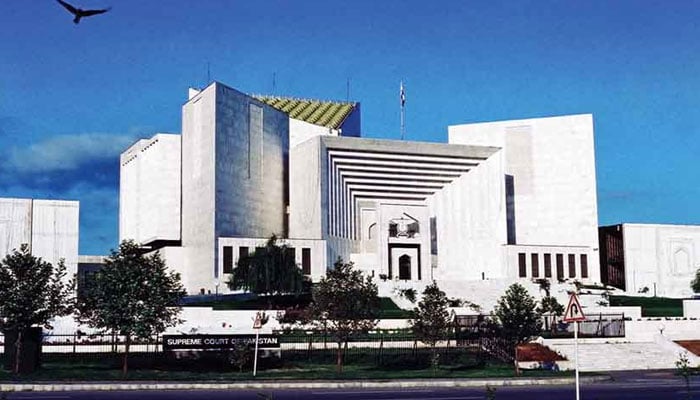Military trials: Transparency in investigation not seen anywhere else, says MoD counsel
Khwaja Haris gives complete sketch of procedure being adopted for trial and investigation in military courts
ISLAMABAD: A constitutional bench of the Supreme Court on Tuesday adjourned until today (Wednesday) the hearing of intra-court appeals of the federal government and the Ministry of Defence against the apex court’s judgment declaring the trials of civilians in military courts as unconstitutional.
A seven-member constitutional bench, headed by Justice Amin-ud-Din Khan, heard the appeals. The bench comprises Justice Jamal Khan Mandokhail, Justice Muhammad Ali Mazhar, Justice Hasan Azhar Rizvi, Justice Mussarat Hilali, Justice Naeem Akhtar Afghan and Justice Shahid Bilal Hassan.
Khwaja Haris, counsel for the Ministry of Defence, while continuing his arguments, answered a volley of questions put forth by the constitutional bench. The learned counsel gave a complete sketch of the procedure being adopted for trial and investigation in the military courts.
Justice Rizvi asked Haris as to who conducts an inquiry under the Army Act, to which he replied that after the framing of charge, the inquiry was done by a commanding officer.
Justice Hilali inquired as to how inquiry was conducted after the charge was framed. Haris replied the investigation was conducted on the basis of charge farmed.
Justice Hilali further asked the defence ministry’s counsel as to whether judges in military courts conduct trials in uniform, to which Haris replied judges in the court martial were mixed in military uniforms. Justice Hilali, however, asked as to how an officer in uniform can be neutral as a judge. At this, Haris replied: “The uniform is also worn by you people (judges)”, on which there was a laughter in the courtroom.
Justice Mandokhail asked the counsel in a lighter tone as to whether he wanted to say there was no difference between black and khaki uniforms. At this, laughter again erupted in the courtroom.
Justice Mandokhail remarked that first a charge was framed and on the basis of the charge, an investigation was conducted, adding the same thing had happened in the FB Ali case. He also asked the counsel unless the crime was proved according to the Army Act, will he come to the military trial.
Haris replied that the allegations levelled were proved in the charge. “There is no doubt that what you (Haris) are reading is that it is the law,” Justice Mandokhail said, adding: “Even if this law is more rigid whether it could be applied to civilians.”
Haris replied he would put all the things before the court as how these could apply to civilians. Justice Mazhar asked the defence ministry’s counsel as to whether the law he was citing was really implemented or not. Haris replied that before the commencement of a trial, the accused was asked whether he had any objection on the judge conducting the trial. He submitted that witnesses were presented before the accused who was also given an opportunity to cross-examine them.
The defence ministry’s counsel claimed that the principle of transparency maintained in the investigation conducted by the army could not be seen anywhere else. Haris was still on his legs when the court’s time got over, following which the hearing was adjourned for today (Wednesday).
-
 King Hospitalized In Spain, Royal Family Confirms
King Hospitalized In Spain, Royal Family Confirms -
 Japan Launches AI Robot Monk To Offer Spiritual Guidance
Japan Launches AI Robot Monk To Offer Spiritual Guidance -
 Japan Plans Missile Deployment Near Taiwan By 2031 Amid Growing Regional Tensions
Japan Plans Missile Deployment Near Taiwan By 2031 Amid Growing Regional Tensions -
 Meghan Markle, Prince Harry Spark Reactions With Latest Announcement
Meghan Markle, Prince Harry Spark Reactions With Latest Announcement -
 Kate Hudson Reflects On Handling Award Season With No Expectations
Kate Hudson Reflects On Handling Award Season With No Expectations -
 6 Celebrities Who Have Been Vocal About Anxiety And 'panic Attacks'
6 Celebrities Who Have Been Vocal About Anxiety And 'panic Attacks' -
 Is This The Future Of Train Travel? Robot Dogs, Drones Are Redefining Public Transit Safety Through China’s New Metro Station Deployment
Is This The Future Of Train Travel? Robot Dogs, Drones Are Redefining Public Transit Safety Through China’s New Metro Station Deployment -
 Sarah Ferguson Seeks Hollywood Backing As Epstein Files Resurface
Sarah Ferguson Seeks Hollywood Backing As Epstein Files Resurface -
 China’s AI Milestone: ByteDance’s Doubao Chatbot Hits 100M Users During Lunar New Year
China’s AI Milestone: ByteDance’s Doubao Chatbot Hits 100M Users During Lunar New Year -
 Think You Know ChatGPT? Here Are 5 AI Levels You’ve Never Seen
Think You Know ChatGPT? Here Are 5 AI Levels You’ve Never Seen -
 Bitcoin Bounces From $62,000 As On-chain Metrics Signal Prolonged Weakness: Here Is Everything To Know
Bitcoin Bounces From $62,000 As On-chain Metrics Signal Prolonged Weakness: Here Is Everything To Know -
 Elon Musk Teases Official Grok CLI For Developers As AI Rivalry With Anthropic Heats Up
Elon Musk Teases Official Grok CLI For Developers As AI Rivalry With Anthropic Heats Up -
 Jennifer Aniston Ready To Walk Down The Aisle Again?
Jennifer Aniston Ready To Walk Down The Aisle Again? -
 Sarah Ferguson’s Plan Now That Andrew Is Thrown Into The Fire: ‘She’s Not Certain She’ll Come Out The Other Side’
Sarah Ferguson’s Plan Now That Andrew Is Thrown Into The Fire: ‘She’s Not Certain She’ll Come Out The Other Side’ -
 ‘The AI Doc’: What AI Leaders Told Daniel Roher Will Keep You Up At Night
‘The AI Doc’: What AI Leaders Told Daniel Roher Will Keep You Up At Night -
 Sarah Ferguson In Hiding As Arrest Fears Grow After Andrew Was Taken Into Custody
Sarah Ferguson In Hiding As Arrest Fears Grow After Andrew Was Taken Into Custody




